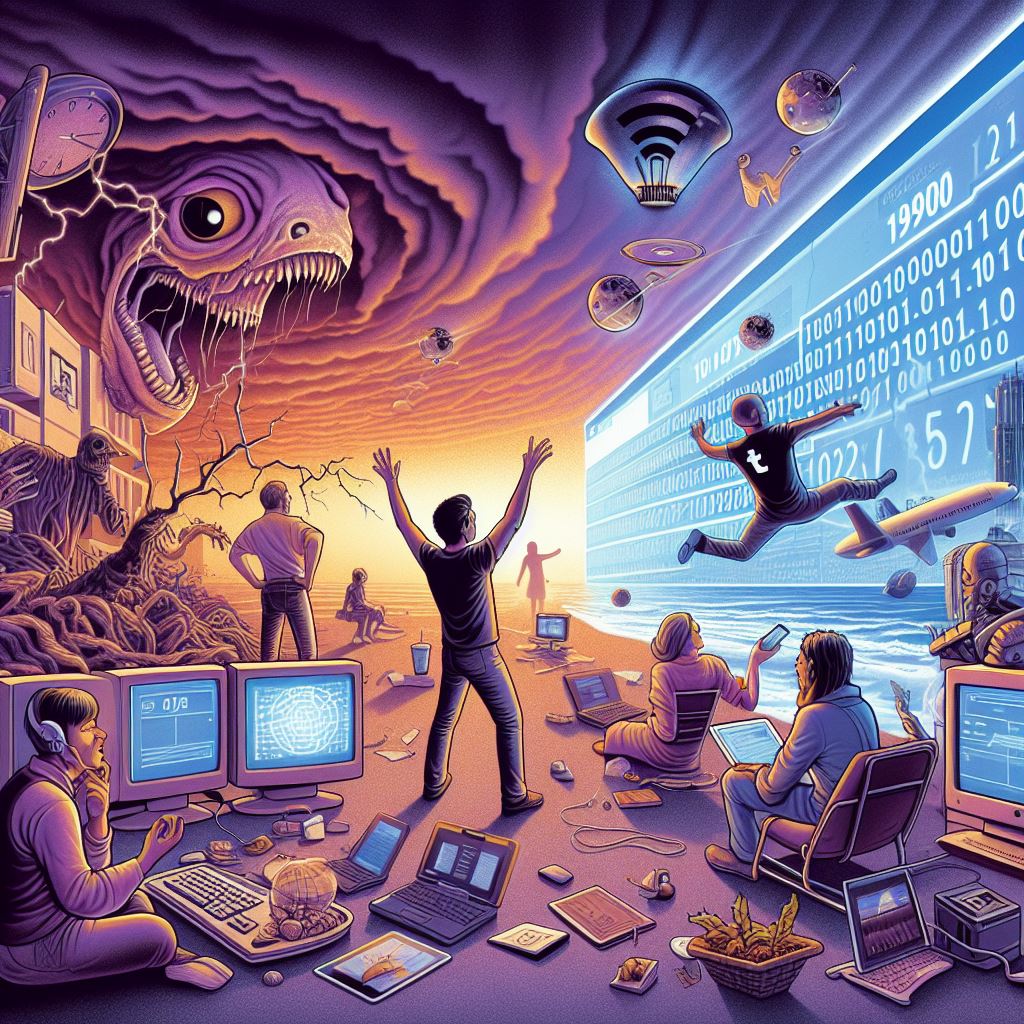As the clock struck midnight on January 1, 2000, the world collectively held its breath. The fear of Y2K loomed large, with concerns that computer systems worldwide would crash as they struggled to process the date change from ’99 to ’00. Fast forward to March 5, 2024, when another technological event grabbed headlines – Facebook’s outage, leaving billions of users unable to access the platform. These two incidents represent pivotal moments in the evolution of technology and the challenges it presents. From the hysteria of potential catastrophe to the inconvenience of a social media blackout, let’s explore how technology has transformed and the challenges it poses along the way.
The Y2K Panic:
The turn of the millennium marked a significant milestone in human history, but it also brought with it unprecedented anxiety surrounding the Y2K bug. Decades of computer programming had utilized a two-digit date format, assuming the year began with “19”. As the year 2000 approached, there were widespread concerns that computers would interpret “00” as 1900, causing systems to malfunction or shut down entirely.
Governments, businesses, and individuals worldwide invested billions of dollars to mitigate the potential impact of Y2K. Software engineers worked tirelessly to identify and fix code vulnerabilities, while organizations stockpiled supplies and developed contingency plans for possible disruptions. While the new year arrived without major incidents, the Y2K panic underscored the interconnectedness of technology and the vulnerabilities inherent in our reliance on it.
The Rise of Social Media:
In the years following the Y2K scare, technology continued to advance at a rapid pace, ushering in the era of social media. Platforms like Facebook, Twitter, and Instagram revolutionized how we connect, communicate, and share information. What began as simple networking sites evolved into sprawling digital ecosystems, shaping social interactions, political discourse, and even economic landscapes.
Facebook emerged as a dominant force in the social media landscape, boasting billions of users worldwide. Its platform became a virtual town square where individuals could share updates, photos, and thoughts in real-time. Businesses leveraged Facebook’s advertising tools to reach targeted audiences, while organizations utilized its groups and pages to engage with supporters and stakeholders.
The Facebook Blackout:
However, on March 5, 2024, the world experienced a stark reminder of technology’s fragility when Facebook suffered a widespread outage. Users across the globe were met with error messages and blank screens as they attempted to access the platform. Facebook, Instagram, WhatsApp, and other services owned by Meta Platforms, Inc. were all affected, leaving users frustrated and scrambling for alternatives.
The outage, which lasted several hours, sparked speculation and scrutiny about the cause. Initial reports suggested a technical issue within Facebook’s infrastructure, although the company remained tight-lipped about the specifics. As users turned to other social media platforms and messaging apps to voice their frustrations, the incident highlighted the central role that technology plays in our daily lives and the potential consequences when it fails.
Technological Challenges in the Modern Era:
From the Y2K panic to Facebook’s blackout, the evolution of technology has brought about a myriad of challenges. While the nature of these challenges has evolved, certain themes persist:
1. Complexity: As technology becomes more advanced, so too do the systems and infrastructure that support it. From intricate software algorithms to sprawling data centers, the complexity of modern technology presents challenges in terms of maintenance, troubleshooting, and security.
2. Interconnectivity: The rise of interconnected devices and systems has created new opportunities for efficiency and innovation, but it has also introduced vulnerabilities. A disruption in one part of the network can have cascading effects across multiple platforms and services, as demonstrated by the Facebook blackout.
3. Security: With the increasing digitization of our lives, cybersecurity has become a paramount concern. Hackers and cybercriminals continuously seek to exploit weaknesses in software and infrastructure, posing threats to individuals, businesses, and governments alike.
4. Dependence: Society’s reliance on technology has reached unprecedented levels, permeating every aspect of our lives. From communication and commerce to healthcare and transportation, technology underpins nearly every facet of modern civilization. As such, disruptions or failures can have far-reaching consequences, underscoring the importance of robust infrastructure and contingency planning.
Looking Ahead:
As we reflect on the journey from Y2K hysteria to Facebook’s blackout, it’s clear that technology will continue to shape our world in profound ways. While the challenges may evolve, the need for vigilance, adaptability, and innovation remains constant. By embracing these principles, we can navigate the complexities of the digital age and harness the transformative power of technology for the benefit of all.


